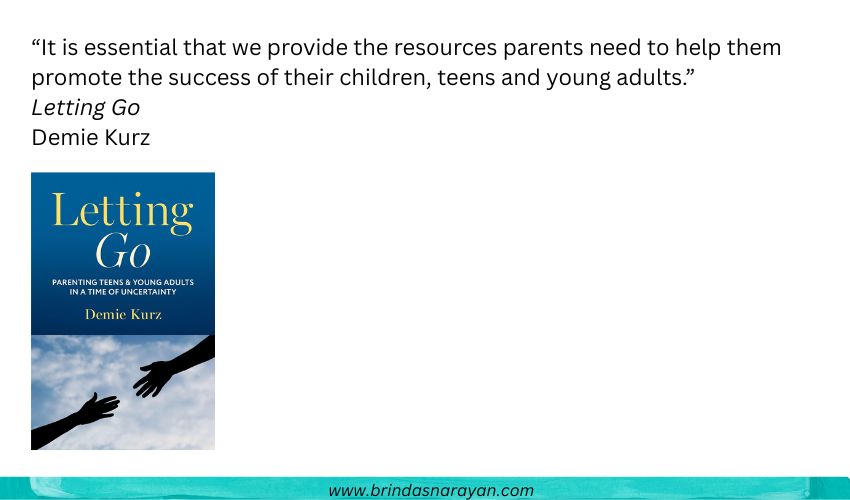
Parenting Teens in Uncertain Times
The recent worldwide hit, Adolescence, highlights how a new edginess has been layered into an already fraught stage of human development. Given that most internet-connected youth are subjected to a globalized monoculture, the show has an unnerving relevance across cultures and geographies. After all, local and linguistic variations might shift the form of teenage reels and memes, but not the substance or the universal insubstantiality of what they are gazing at. In the four-part web series, we witness how a pervasive manosphere seeps into preteens and teens, forging a new language of shared symbols that parents, teachers and other adult figures are mostly excluded from. How can you tell if your kids are exposed to perilous content if you can’t decode their emojis?
This might be only the latest threat that parents are waking up to. As the sociologist Demie Kurz reveals in Letting Go, there has always been an element of struggle in raising teenagers who are trying to “individuate” and “differentiate” from parents and peer groups. In her study of 118 American mothers across class and race, she finds that uncertainty has always been braided into parenting. Clear from the start that parenting is not a one-way process but a dialectic between parent and child, she observes in her Preface, “mothers’ descriptions demonstrate the negotiated character of parenting and the integral role children play in the process.”
The book is not a psychological how-to that doles out advice to already-burdened parents and especially mothers. Rather, this is an attempt to understand parenting as a social process – on how it unfolds across class and race, and how surroundings forces ought to be reshaped to make it easier for parents to handle one of the most invisibilized, underpaid, and critical jobs.
It’s also ironic but perhaps unsurprising that shockingly few sociological studies focus on mothering teenagers. While psychological manuals, self-help books and articles abound, these can feel on target for some, but confusing, overwhelming or irrelevant to others. After all, while many parents strive to occupy the ideal sweet spot between “over hovering” and “negligence,” real life situations test their intentions.
Such lack of sociological interest reinforces a narrative of “parental determinism” in which parents and in particular, mothers, are held responsible for outcomes. In such a “top-down model” mothers are assumed to be commanding and controlling their kids. This places a heftier load on all mothers, but particularly on poorer mothers and “mothers of color.” (In the Indian context, these would be mothers straddling caste, class and status). While socioeconomic position no doubt plays a role, many mothers – even elite ones – ferry disproportionately larger parenting burdens than fathers. Top down models also fail to account for the fact that “[many] things shape and constrain the process of raising children beyond parents’ individual actions.”
Also command-and-control as a model for parenting can only be proposed by those who don’t get kids. After all, it obscures the role played by children who can defy parents, ignore their wishes or turn to social media and peer messages. This also ignores the fact that other adults shape kids’ lives – like teachers, tutors, friends’ parents, grandparents, relatives et al. Moreover, teens are sometimes in environments that their parents are not familiar with or don’t adequately comprehend.
Many mothers admitted to Kurz that one of the aspects they struggled with most was “letting go” – granting young adults the autonomy they require. While they let go, they need to ensure that they complete high school successfully, are emotionally secure and capable of taking decisions for their own well-being. All this, at a time, when their teenagers are likely to communicate less. “Mothers can’t always trust what their teens tell them, and their children may not reveal everything mothers would like to know.”
Social environments have become riskier now. Even upper middle class mothers, while being able to access good private and public schools and a range of resources, are anxious about kids using drugs and alcohol, getting into car accidents or absorbing harmful information from phones. Like upper middle-class mothers, middle-class mothers also obsess about alcohol, drugs and accidents. While they live in more or less safe neighborhoods, they’re anxious about their teens experiencing crime and violence as they wander further afield. They worry about how they will pay for college. Working class mothers have the added burden of unsafe neighborhoods to wrangle with. This is partially offset, for some, by childcare support offered by family members who live close by.
While parenting is taxing and difficult, it can also be immensely rewarding. Teens can be fun. They can become like friends and help parents figure out technology, new-age lingo and changing workplaces. Along the way, there are real struggles. As a mother puts it, in any other job, if you quit, someone else will take your place. But when it comes to mothering, “If you’re the mother and you drop dead, who picks up the pieces? It has a huge impact on a family, and in some ways, they never get over it.”
Essentially, we have to ensure that parents are aided by policy makers and corporate stakeholders, especially technology companies. At this point, many parents world over have to negotiate curfews, parties, tattoos, relationships, time on phones and social media. At the very least, let’s not add to an already overfilled list. Ideally, we ought to insist on guardrails to ensure that parents can “let go” with ease, rather than struggle with a growing list of challenges – alone.
References
Demie Kurz, Letting Go: Parenting Teens and Young Adults in a Time of Uncertainty, Oxford University Press, 2024




